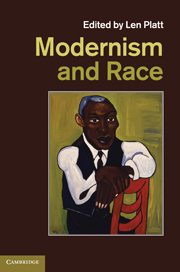Book contents
- Frontmatter
- Contents
- Notes on contributors
- Introduction
- 1 Germanism, the modern and ‘England’ – 1880–1930: a literary overview
- 2 ‘All these fellows are ourselves’: Ford Madox Ford, race and Europe
- 3 ‘’Tis optophone which ontophanes': race, the modern and Irish revivalism
- 4 Generating modernism and New Criticism from antisemitism: Laura Riding and Robert Graves read T. S. Eliot's early poetry
- 5 Race, modernism and the question of late style in Kipling's racial narratives
- 6 Atlantic modernism at the crossing: the migrant labours of Hurston, McKay and the diasporic text
- 7 Claude McKay in Britain: race, sexuality and poetry
- 8 Wyndham Lewis and the modernists: internationalism and race
- 9 ‘Until Hanandhunigan's extermination’: Joyce, China and racialised world histories
- 10 Race, gender and the Holocaust: traumatic modernity, traumatic modernism
- Index
- References
2 - ‘All these fellows are ourselves’: Ford Madox Ford, race and Europe
Published online by Cambridge University Press: 03 May 2011
- Frontmatter
- Contents
- Notes on contributors
- Introduction
- 1 Germanism, the modern and ‘England’ – 1880–1930: a literary overview
- 2 ‘All these fellows are ourselves’: Ford Madox Ford, race and Europe
- 3 ‘’Tis optophone which ontophanes': race, the modern and Irish revivalism
- 4 Generating modernism and New Criticism from antisemitism: Laura Riding and Robert Graves read T. S. Eliot's early poetry
- 5 Race, modernism and the question of late style in Kipling's racial narratives
- 6 Atlantic modernism at the crossing: the migrant labours of Hurston, McKay and the diasporic text
- 7 Claude McKay in Britain: race, sexuality and poetry
- 8 Wyndham Lewis and the modernists: internationalism and race
- 9 ‘Until Hanandhunigan's extermination’: Joyce, China and racialised world histories
- 10 Race, gender and the Holocaust: traumatic modernity, traumatic modernism
- Index
- References
Summary
In Methuen's catalogue for September 1907, there is a listing of the publisher's ‘Standard Library’, described as ‘a new series of volumes containing the great classics of the world, and particularly the finest works of English literature … It is the ambition of the publishers to place the best books of the Anglo-Saxon race within the reach of every reader’. The ‘classics of the world’ here include Marcus Aurelius, St Francis and Dante, all effortlessly assimilated, to take their places amongst ‘the best books of the Anglo-Saxon race’, as if the act of translation into the English language also somehow translated national or racial identities.
Ford Madox Hueffer, as he then still was – he didn't change his name to Ford Madox Ford until after the First World War – might, as the son of an English mother and a German father, have been expected to take a particular interest in the notion of an ‘Anglo-Saxon race’. And so he did. Not only did he publish a novel, An English Girl, that year of 1907 – and to which that catalogue was appended; but he had also written a discursive book about the English, The Spirit of the People, published the following month. This was the third volume of a trilogy, following The Soul of London (1905) and The Heart of the Country (1906). The three were collected into an American omnibus edition, called England and the English (also 1907), though it was originally to have been titled The Anglo Saxons.
- Type
- Chapter
- Information
- Modernism and Race , pp. 39 - 57Publisher: Cambridge University PressPrint publication year: 2011
References
- 1
- Cited by



